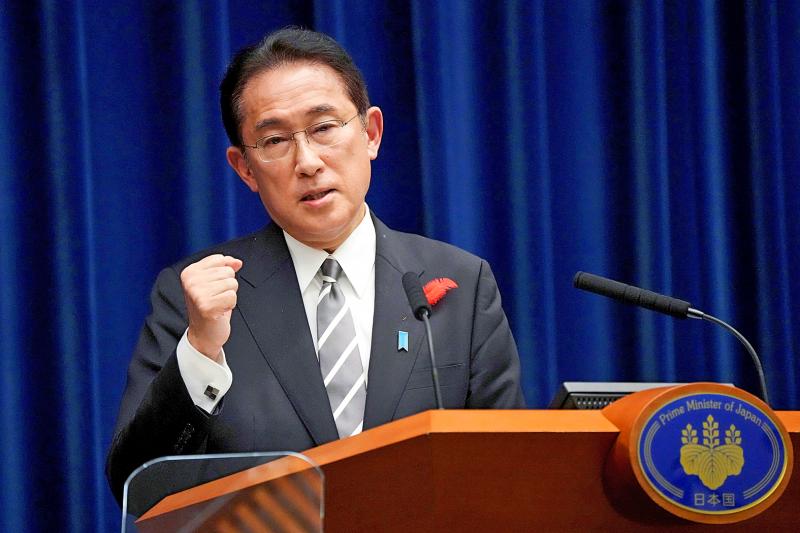Japanese Prime Minister Fumio Kishida yesterday dissolved the lower house of parliament, paving the way for elections on Oct. 31 that would be the country’s first of the COVID-19 pandemic.
At stake will be how Japan faces a potential COVID-19 resurgence and revives its battered economy, and if or how Kishida’s government can leave the shadow of nine years of rule under former Japanese prime minister Shinzo Abe and former Japanese prime minister Yoshihide Suga.
Kishida said he is seeking a mandate for his policies after being elected prime minister by parliament only 10 days ago.

Photo: Reuters
He replaced Suga, who lasted just a year as prime minister and whose support was battered by his perceived high-handed approach in dealing with COVID-19 and insistence on holding the Tokyo Olympics, despite rising virus cases.
Kishida, tasked with rallying support for the ruling party, has promised to pursue politics of “trust and empathy.”
Four main opposition parties have agreed to cooperate on some policies, such as addressing gaps between the rich and the poor, which they say widened during Abe’s government and were worsened by the pandemic.
After Japanese House of Representatives Speaker Tadamori Oshima announced the dissolution, the 465 lawmakers in the more powerful lower chamber stood up, shouted “banzai” three times and left. Official campaigning for all 465 newly vacant seats begins on Tuesday.
The previous House of Representatives election was in 2017 under Abe, a staunch conservative who pulled the long-ruling conservative Liberal Democratic Party (LDP) further to the right during his stint as Japan’s longest-serving prime minister.
In that vote, the LDP and its coalition partner New Komeito together won 310 seats, or two-thirds of the chamber.
Opposition parties have struggled to win enough votes to form a new government after the brief rule of the now-defunct Democratic Party of Japan from 2009 to 2012. With weaker LDP support under Suga, the party lost three parliamentary by-elections and a local vote this year to opposition contenders.
Yukio Edano, head of the Constitutional Democratic Party of Japan, the largest opposition party, told Japan Broadcasting Corp that he hopes to make the election “a first step toward changing the politics.”
In his first policy speech last week, Kishida promised to improve the country’s pandemic response, revive the economy, and bolster defenses against threats from China and North Korea.
He also sought to gradually expand social and economic activities by using vaccination certificates and more testing.
Yuichiro Tamaki, head of the Democratic Party for the People, said Kishida was selfish for dissolving the lower house so early in his tenure.
“It is unclear on what policies he is seeking a mandate from the voters,” Tamaki said.
He said his party would propose an economic policy that seeks higher pay for workers.
“We want to create a political situation where ruling and opposition blocs are in close competition,” Tamaki said.

The CIA has a message for Chinese government officials worried about their place in Chinese President Xi Jinping’s (習近平) government: Come work with us. The agency released two Mandarin-language videos on social media on Thursday inviting disgruntled officials to contact the CIA. The recruitment videos posted on YouTube and X racked up more than 5 million views combined in their first day. The outreach comes as CIA Director John Ratcliffe has vowed to boost the agency’s use of intelligence from human sources and its focus on China, which has recently targeted US officials with its own espionage operations. The videos are “aimed at

STEADFAST FRIEND: The bills encourage increased Taiwan-US engagement and address China’s distortion of UN Resolution 2758 to isolate Taiwan internationally The Presidential Office yesterday thanked the US House of Representatives for unanimously passing two Taiwan-related bills highlighting its solid support for Taiwan’s democracy and global participation, and for deepening bilateral relations. One of the bills, the Taiwan Assurance Implementation Act, requires the US Department of State to periodically review its guidelines for engagement with Taiwan, and report to the US Congress on the guidelines and plans to lift self-imposed limitations on US-Taiwan engagement. The other bill is the Taiwan International Solidarity Act, which clarifies that UN Resolution 2758 does not address the issue of the representation of Taiwan or its people in

US Indo-Pacific Commander Admiral Samuel Paparo on Friday expressed concern over the rate at which China is diversifying its military exercises, the Financial Times (FT) reported on Saturday. “The rates of change on the depth and breadth of their exercises is the one non-linear effect that I’ve seen in the last year that wakes me up at night or keeps me up at night,” Paparo was quoted by FT as saying while attending the annual Sedona Forum at the McCain Institute in Arizona. Paparo also expressed concern over the speed with which China was expanding its military. While the US

SHIFT: Taiwan’s better-than-expected first-quarter GDP and signs of weakness in the US have driven global capital back to emerging markets, the central bank head said The central bank yesterday blamed market speculation for the steep rise in the local currency, and urged exporters and financial institutions to stay calm and stop panic sell-offs to avoid hurting their own profitability. The nation’s top monetary policymaker said that it would step in, if necessary, to maintain order and stability in the foreign exchange market. The remarks came as the NT dollar yesterday closed up NT$0.919 to NT$30.145 against the US dollar in Taipei trading, after rising as high as NT$29.59 in intraday trading. The local currency has surged 5.85 percent against the greenback over the past two sessions, central